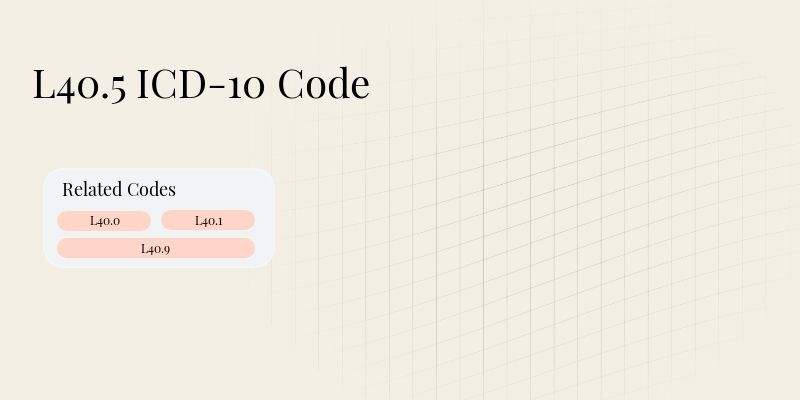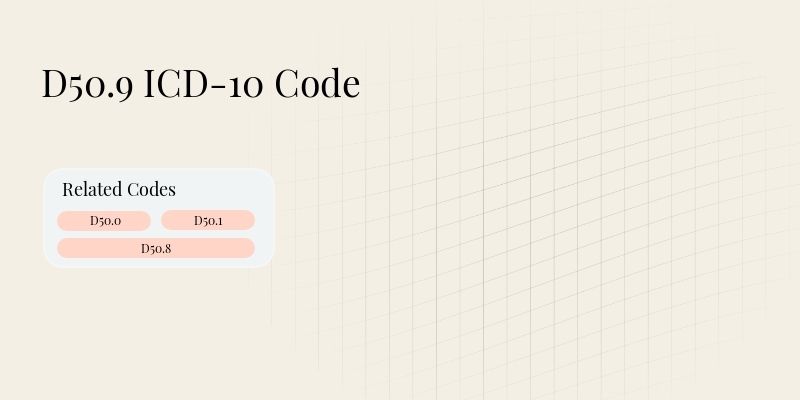
L40.5 ICD-10 Code: Psoriatic arthritis

Key Takeaways
- What L40.5 ICD-10 Code Covers: This code specifically designates psoriatic arthritis, a chronic inflammatory condition associated with psoriasis. It encompasses various symptoms such as joint pain, stiffness, and swelling.
- Session duration requirements: To ensure accurate coding, the patient must have documented symptoms and a clear diagnosis during at least two visits, which helps establish the chronic nature of the condition.
- Who can use the code: This code can be used by healthcare providers, including rheumatologists, dermatologists, and primary care physicians, who diagnose and manage patients with psoriatic arthritis.
- Best practice for proper use: Clear documentation of symptoms, diagnosis, and treatment plans is essential. Ensure that all relevant clinical notes and assessments are included in the patient's medical record.
- Example of actual usage: A rheumatologist may code L40.5 after confirming joint inflammation in a patient with a history of psoriasis, supported by radiological findings.
What is L40.5 ICD-10 Code
The L40.5 ICD‑10 code refers to psoriatic arthritis, a type of inflammatory arthritis that affects some individuals with psoriasis. It is characterized by joint pain, swelling, and stiffness, which can significantly impact a patient's quality of life. Understanding this code is essential for accurate diagnosis and effective treatment planning.
Psoriatic arthritis can manifest with varying degrees of severity and may involve different joints, including the fingers, toes, and spine. Diagnosis often requires a comprehensive evaluation, including patient history, physical examination, and imaging studies. Proper coding ensures that patients receive appropriate care and that healthcare providers are adequately reimbursed for their services.
Services Covered Under L40.5 ICD-10 Code
This code covers a range of services related to the diagnosis and management of psoriatic arthritis. The following table outlines these services in detail:
Service | Description |
|---|---|
Initial Consultation | Comprehensive evaluation including history, physical exam, and diagnostic tests. |
Follow-up Visits | Regular appointments to monitor disease progression and treatment efficacy. |
Imaging Studies | X-rays or MRIs to assess joint damage and inflammation levels. |
Laboratory Tests | Blood tests to rule out other conditions and assess inflammatory markers. |
Medication Management | Prescription of DMARDs, biologics, or NSAIDs for symptom control. |
Who Can Use the L40.5 ICD-10 Code?
This code can be employed by various healthcare professionals involved in the diagnosis and treatment of psoriatic arthritis:
- Rheumatologists: Specialists who focus on autoimmune and inflammatory diseases, including arthritis.
- Dermatologists: Physicians specializing in skin conditions who often encounter patients with psoriasis and related joint issues.
- Primary Care Physicians: General practitioners who may diagnose and manage the initial symptoms of psoriatic arthritis.
- Physical Therapists: Healthcare professionals who provide rehabilitation services for patients experiencing joint pain and mobility issues.
How to Use L40.5 ICD-10 Code
Proper application of the L40.5 code involves several key steps:
- Confirm Diagnosis: Ensure that a definitive diagnosis of psoriatic arthritis is established through clinical evaluation and supporting tests. Example: A patient presenting joint pain and a history of psoriasis.
- Document Symptoms: Clearly record all symptoms related to the condition in the patient's medical record. Example: Noting joint stiffness and swelling in the assessment notes.
- Include Treatment Plans: Outline the treatment strategies being implemented. Example: Documenting the initiation of biologic therapy in the treatment plan.
- Monitor Progress: Regularly update the patient's status and response to treatment in follow-up visits. Example: Noting improvement in joint function during subsequent consultations.
Reimbursement Rates for L40.5 ICD-10 Code
Insurance Type | Average Reimbursement Rate |
|---|---|
Medicare | $120 |
Medicaid | $95 |
Private Insurance | $150 |
Disclaimer: Reimbursement rates can fluctuate based on various factors, including geographic location, specific insurance contracts, and changes in healthcare policy. This article will be updated with average prices as they change.
Benefits of L40.5 ICD-10 Code
The L40.5 code provides several benefits to healthcare providers and patients alike:
Benefit | Description |
|---|---|
Accurate Diagnosis | Facilitates precise identification of psoriatic arthritis, ensuring proper treatment. |
Improved Treatment Plans | Enables the development of tailored management strategies based on individual patient needs. |
Enhanced Patient Outcomes | Promotes better health results through targeted therapies and follow-up care. |
Reimbursement Compliance | Ensures proper coding for reimbursement, reducing the risk of claim denials. |
Common Mistakes to Avoid with L40.5 ICD-10 Code
Misuse of this code can lead to audits, claim denials, and loss of revenue for healthcare providers. Common mistakes include:
- Inadequate Documentation: Failing to document all relevant symptoms and treatment plans can lead to coding errors. For example, a lack of clinical notes about joint pain during follow-up visits.
- Incorrect Coding: Using the wrong code or misclassifying the condition can result in denied claims. An example would be coding for rheumatoid arthritis instead of psoriatic arthritis.
- Neglecting Follow-up Visits: Not documenting follow-up appointments can create gaps in care continuity. For instance, not recording a patient's response to therapy during subsequent visits.
- Inconsistent Use of Code: Inconsistently applying the code across various encounters can confuse payers. An example is using the code for initial evaluations but not for follow-up visits.
L40.5 ICD-10 Code vs other codes
Understanding how this code compares to other similar codes is crucial for accurate coding practices. The table below highlights key differences:
Code | Description | Notes |
|---|---|---|
L40.5 | Psoriatic arthritis | Specific to arthritis associated with psoriasis. |
M05.79 | Other rheumatoid arthritis | Used for various forms of rheumatoid arthritis. |
M06.9 | Arthritis, unspecified | General code without specificity. |
L40.0 | Psoriasis | Refers only to the skin condition without joint involvement. |
Conclusion
The L40.5 ICD‑10 code is essential for accurately coding psoriatic arthritis, a condition that significantly affects patients' lives. Proper usage of this code requires comprehensive documentation of the diagnosis, symptoms, and treatment plans. Various healthcare providers can employ this code, ensuring that patients receive appropriate care and that providers are reimbursed accordingly.
Disclaimer: This article is for informational purposes only and does not constitute legal or medical advice. Always consult professional guidelines and regulatory bodies for specific compliance requirements.
Frequently Asked Questions
Reduce burnout,
improve patient care.
Join thousands of clinicians already using AI to become more efficient.

CO-185 Denial Code: Provider Ineligible to Perform Service
Discover essential insights on the CO-185 Denial Code code for health professionals. Enhance your practice and navigate billing with confidence.

97802 CPT Code: Initial assessment for medical nutrition therapy
Discover essential insights on the 97802 CPT Code code for health professionals. Enhance your practice and navigate billing with confidence.

D50.9 ICD-10 Code: Microcytic Anemia
Discover essential insights on the D50.9 ICD-10 Code code for health professionals. Enhance your practice and navigate billing with confidence.
